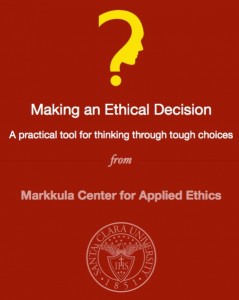I recently received an email from The Big Q (@thebigqethics), an online project of the Markkula Center for Applied Ethics at Santa Clara University. She told me about an app they created to help students with decisions using a step-by-step approach to ethical questions. Today’s App Tuesday post is a guest post explaining the ethics app and its uses.
 While most universities offer ethics classes, the focus of these courses is often on questions that can seem distant to most students, like euthanasia or capital punishment. But college students face ethical dilemmas every day: What do I do if I see someone cheating on a test? Should I take a study drug? What is my responsibility to a roommate who is depressed?
While most universities offer ethics classes, the focus of these courses is often on questions that can seem distant to most students, like euthanasia or capital punishment. But college students face ethical dilemmas every day: What do I do if I see someone cheating on a test? Should I take a study drug? What is my responsibility to a roommate who is depressed?
An app created by the Markkula Center for Applied Ethics at Santa Clara University provides a step-by-step approach to ethical questions both big and small: Ethical Decision Making: A Practical Tool for Thinking Through Tough Choices. The app takes users through a process that begins with getting the facts and identifying the stakeholders in the situation. Then they’re introduced to five classic ethical approaches—Utility, Rights, Justice, Common Good, and Virtue—posing questions such as “Does this action produce the most good and do the least harm for all who are affected?” and “Does this action treat people equally or proportionally?”
Finally, users weight the different approaches and get a score that indicates whether their thinking is on the right track or whether they should evaluate another option. The app does not give a “yes” or “no” answer, but the score helps users decide if they wish to move forward with the decision.
Santa Clara is using the app this year with all incoming students during its orientation sessions on academic integrity and cheating. The app has been downloaded 4,900 from the Apple App store and viewed almost 8,000 times online.
The app draws on the Ethics Center’s popular “Framework for Ethical Decision Making,” which has been online for almost 20 years and viewed over a million times. “The Center has always believed that we need a deliberate method to make good ethical decisions,” said Center Executive Director Kirk O. Hanson. “We’ve used the Framework for many years, and we’re delighted to offer it in a new medium that may be particularly attractive to a new generation.”
